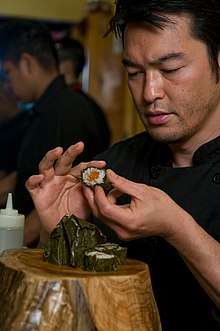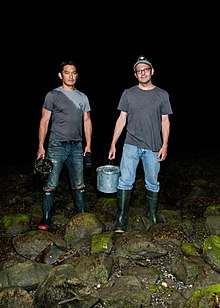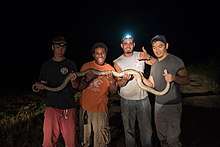Bun Lai
Bun Lai (born 1973) is a Hong Kong-born American chef. He is a leader in the sustainable food movement.[1][2] His family restaurant, Miya's in New Haven, Connecticut, is the first sustainable sushi restaurant in the world.[3][4] His mother, a Congressional Award recipient for her contribution in sustainable seafood,[5] is the founder of Miya's and his father is a Cambridge and Yale University-educated scientist and surgeon.[6][7]
Bun Lai | |
|---|---|
| Born | 1973 (age 46–47) |
| Nationality | American |
| Occupation | Chef, restaurateur |
| Years active | 1992–present |
| Known for | Miya's sustainable sushi sustainable seafood |
Bun Lai and Miya's has been featured wide range of publications including National Geographic,[8] Time Magazine,[9] The New York Times,[10] Prevention Magazine,[11] Eating Well Magazine,[12] Outside Magazine,[13] Scientific American,[14] The Atlantic,[15] Food and Wine Magazine,[16] and The New Yorker,[17] Popular Mechanics Magazine, [18]
Career
In 2001, Bun Lai initiated the removal from the menu of seafood that was caught or farmed in a way that was detrimental to the long term well-being of the harvested species or its habitats. Bun Lai is credited as the first chef in the world to implement a sustainable seafood paradigm to the cuisine of sushi.[19][20][21][3] The sweet potato sushi roll, which Bun Lai created in 1995 at Miya's, is the California Roll of plant-based sushi. Today it can be found on sushi menus throughout the country.[22][23] The use of brown rice — instead of white rice — and other whole grains for sushi, is also a Bun Lai innovation, which today is emulated throughout the world of sushi.[24][12]

Chef Bun Lai created the first menu dedicated to the idea of using invasive species at Miya's in 2005, during which time half the menus invasive species offerings were conceptual because invasive species were not yet commercially available.[25] The menu featured locally caught invasive species such as Asian shore crabs and European green crabs. The invasive species menu was created in order to take pressure off of popular over-fished species by utilizing ones, instead, that are abundant but ecologically destructive. [14][11][26][27] Today, Miya's offers a plethora of invasive species such as Chesapeake blue catfish, Florida lionfish, Kentucky silver carp, Georgia cannonball jellyfish, and invasive edible plants such as Connecticut Japanese knotweed and Autumn olive.[28]
Bun Lai is on the Council of Directors for the True Health Coalition/GLIMMER which was founded by Dr. David Katz (Director Yale University Prevention Research Center) and Dan Buettner (Director Blue Zones Project).[29] Bun Lai is the former Director of Nutrition for a non-for-profit that serves low income diabetics.[30]

Bun Lai has authored papers which were published in Scientific American and Harvard University Design Magazine.[14][3] He is a sought after educator who has spoken at the White House and as a keynote for organizations such as The American Fisheries Society[31] and the World Wildlife Fund at the National Geographic Society.[22] He has been on Chopped in Season 9 and was chopped after Round 1 due to cutting himself and contaminating his dishes.

Accolades
- 2018 James Beard Foundation Broadcast Media Documentary Finalist, Blind Sushi [32]
- White House Champion of Change for Sustainable Seafood Award[33]
- 2013 James Beard Foundation Nominee: Best Chef Northeast [34]
- An EcoSalon 11 Most Influential Chefs in the U.S.[1]
- New Haven 50 Most Influential Person[35]
- Huffington Post's Greatest Person of the Day[24]
- Recipient of the Yale Elm-Ivy Award.[36]
References
- "11 Eco-Chefs Who Are Changing the Way We Think About Food". Ecosalon.com. 4 November 2010. Retrieved 28 July 2018.
- "This is what a more sustainable American food system looks like". Grist.org. 21 August 2014. Retrieved 28 July 2018.
- "Harvard Design Magazine: Why Fight Them When We Can Eat Them?". Harvarddesignmagazine.org. Retrieved 28 July 2018.
- "6 Restaurants in New Haven Where Food Meets Culture". Blog.shermanstravel.com. Retrieved 28 July 2018.
- "White House Honors Miya's - New Haven Independent". Newhavenindependent.org. 31 October 2016. Retrieved 28 July 2018.
- "Why Connecticut is doing sushi right". Grist.org. 27 August 2014. Retrieved 28 July 2018.
- Seyfried, Thomas N.; Yu, Robert K.; Miyazawa, Nobuko; Lai, Yin‐Lok (1982). "Retinal Gangliosides in RCS Mutant Rats". Journal of Neurochemistry. 39 (1): 277–279. doi:10.1111/j.1471-4159.1982.tb04735.x.
- "Lionfish and Friends: How Chefs Tackle Invasive Fish". Theplate.nationalgeographic.com. 23 June 2015. Retrieved 28 July 2018.
- "Should I Eat Sushi?". Time.com. Retrieved 28 July 2018.
- Wallace, Hannah. "Safer Sushi". Tmagazine.blogs.nytimes.com. Retrieved 28 July 2018.
- "Meet The Sustainable Sushi Chef Who Also Lassoes Giant Jellyfish The Size Of Volkswagens". Prevention.com. 25 August 2014. Retrieved 28 July 2018.
- "Sushi Master Bun Lai's Sushi Recipes for the Future". Eatingwell.com. Retrieved 28 July 2018.
- "Outside magazine, April 2014". Outsideonline.com. 1 March 2014. Retrieved 28 July 2018.
- Lai, Bun (20 August 2013). "How (and Why) to Eat Invasive Species". Scientific American. 309 (3): 40–43. Bibcode:2013SciAm.309c..40L. doi:10.1038/scientificamerican0913-40. PMID 24003552. Retrieved 28 July 2018.
- Matsumoto, Nancy (11 July 2013). "Have You Ever Tried to Eat a Feral Pig?". Theatlantic.com. Retrieved 28 July 2018.
- "Sustainable Seafood: The Good News". Foodandwine.com. Retrieved 28 July 2018.
- "Alien Entrées". Foodandwine.com. Retrieved 28 July 2018.
- "The Sushi Chef Turning Invasive Species Into Delicacies". Popularmechanics/com. 6 October 2016. Retrieved 28 July 2018.
- "Speakers - Pages - WWF". World Wildlife Fund. Retrieved 28 July 2018.
- "Australis Barramundi: The Better Fish®". Australis Barramundi. Archived from the original on 2016-03-04. Retrieved 28 July 2018.
- "Cancer to Climate Change: Sushi that Addresses the Problem of Modern Eating - Videos - WWF". World Wildlife Fund. Retrieved 28 July 2018.
- "Ocean to Table Sushi that Is Seriously out of this World! Miya's Sushi – New Haven, CT". Omnomct.wordpress.com. 12 November 2012. Retrieved 28 July 2018.
- Fenton, Dominique (25 October 2010). "HuffPost's Greatest Person Of The Day: Bun Lai, Chef And Sustainable Sushi Guru". Retrieved 28 July 2018 – via Huff Post.
- Jacobsen, Rowan (14 May 2019). "The Invasivore's Dilemma". Outsideonline.com. Retrieved 14 May 2019.
- Jacobsen, Rowan (24 March 2014). "The Invasivore's Dilemma". Outsideonline.com. Retrieved 28 July 2018.
- "One Restaurant's Deadliest Catch". Fsrmagazine.com. 2 January 2012. Retrieved 28 July 2018.
- "Miya's Sushi Menu". Retrieved 14 May 2019.
- "Archived copy" (PDF). Archived from the original (PDF) on 2015-09-19. Retrieved 2015-08-15.CS1 maint: archived copy as title (link)
- "New Haven Farms triples capacity". Yaledailynews.com. Retrieved 28 July 2018.
- "Archived copy". Archived from the original on 2015-09-23. Retrieved 2015-08-15.CS1 maint: archived copy as title (link)
- "The 2018 James Beard Award Nominees". Retrieved 14 May 2019.
- "Archived copy". Archived from the original on 2015-07-08. Retrieved 2016-11-06.CS1 maint: archived copy as title (link)
- Template:JBF Announces Nominees
- "New Haven Living by Wehaa". Npaper-wehaa.com. Retrieved 28 July 2018.
- "Past Elm-Ivy Award Citations : Office of New Haven and State Affairs". Onhsa.yale.edu. Retrieved 28 July 2018.